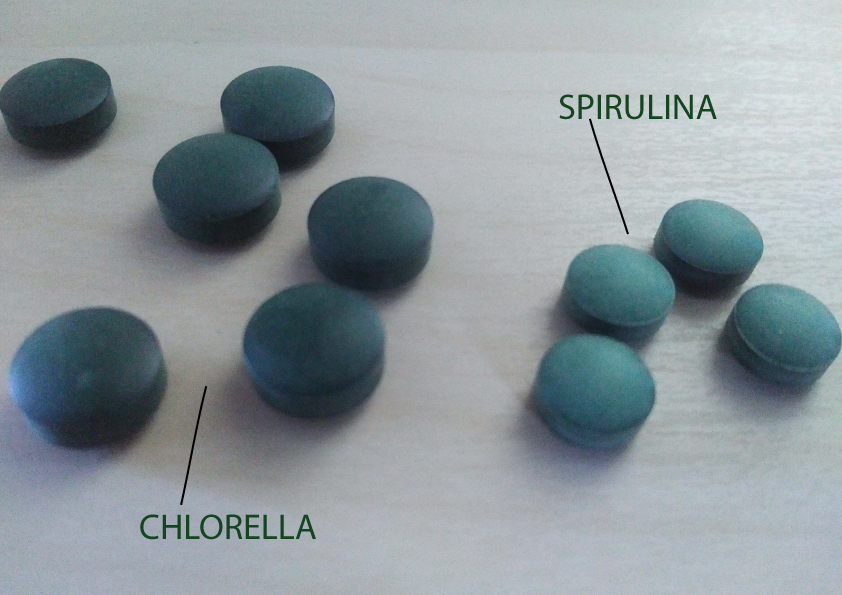The properties and benefits of Spirulina
Even though Chlorella and Spirulina are generally marketed as having the same effects and being good for everyone in equal measure, they have distinct properties. To start with, whereas Chlorella is a single cell micro-algae and has a nucleus, Spirulina is multicellular and has no nucleus.
The cell walls of the Spirulina are composed of MPs (mucopolysaccharides), complex sugars which are easily digestible by the human body and so Spirulina can be used and consumed right after harvesting. On the other hand, Chlorella’s cellular walls are made of the cellulose typical of other micro-algae, plants and seeds, which is hard to digest. This means that, in order to enable absorption by the human body, it needs to undergo extra processes to break up these cellular walls before it can be sold, which explains the higher price of Chlorella.
In terms of composition and benefits, they are similar but with a couple of important differences. Spirulina has most of the benefits mentioned for Chlorella (read the blogpost on Chlorella here), except that it contains half the amount of Chlorophyll (which explains the darker green of Chlorella) half the nucleic acid but much more beta-carotin. In addition, because it contains far less fatty acids, it is not as effective at reducing cholesterol as Chlorella.
A distinctive feature of Spirulina is that, unlike Chlorella, it contains biliprotein. This is claimed to be useful in preventing cancer (although the two micro-algae can be safely combined if necessary).
Spirulina has also been used in the treatment of the following conditions:
- Repairing liver damage as a result of overconsumption of animal protein and refined foods, malnutrition, alcoholism and the consumption of nutrient-destroying foods and drugs.
- Anaemia – it builds and enriches the blood.
- Hepatitis – it detoxifies the liver.
- Gastritis – it promotes healthy intestinal flora.
- Diabetes and Hypoglycaemia – by regulating and balancing blood sugar.
- Poor skin tone and most chronic skin outbreaks.
- Obesity – the lower fat content compared to Chlorella makes it a better alternative in weightloss regimes.
- Increases mental capacity -the phycocyanin contained in Spirulina increases mental capacity by drawing together amino acids for the formation of neurotransmitters.
Chlorella vs Spirulina - The TCM perspective
From a TCM perspective Spirulina is cooling, increases yin fluids, detoxifies the kidney and the liver, builds and enriches the blood, cleanses the arteries and enhances intestinal flora. It is contraindicated for those suffering from cold and damp symptoms such as mucus, yeast and cysts in the lower abdomen. It is good for overcoming deficiencies and for those with problems digesting.
Chlorella, on the other hand is the least cooling, most tonifying and most gently cleansing of the micro-algae. It is most useful for deficiencies, in regulating blood sugar imbalances as well as reducing cholesterol.
How to add Chlorella or Spirulina to your diet
According to your particular needs, you can take chlorella or spirulina in supplement form. The general advice is to supplement for 2 to 3 months, maximum. They both come in one of three forms: liquid, tablet or powdered. Personally, given the colour and smell, plus the fact that the powders are usually added to smoothies (I’m not a smoothie person), I prefer to take them in their pill form.
Since these micro-algae absorb toxins (which is why you are consuming them in the first place!) the source is of vital importance. They must be grown in a clean environment, otherwise you will be adding additional toxins to your body, rather than eliminating them!
A word of caution: Like all supplements they should be taken under the supervision of a qualified doctor. Remember that, like seaweeds, micro-algae are rich in iodine so they can affect your thyroid function. You are probably better off staying away from these altogether if you already suffer from hyperthyroidism.
Also, please remember that taking chlorella and spirulina will not compensate for an otherwise unhealthy diet. The two must go hand in hand. They are not shortcuts, but supplements to an already healthy lifestyle.
Happy Year, Happy Detoxing.


